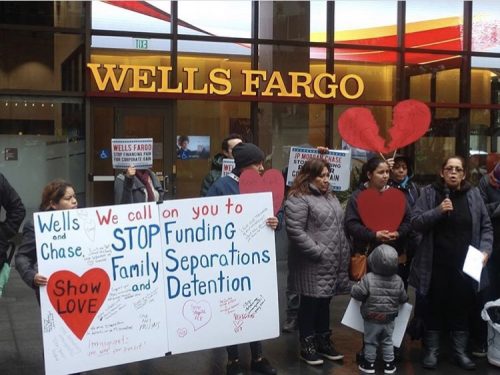
Last summer, on the heels of a federal judge ordering that immigration officials stop following Trump’s policy of ripping children away from their parents, Presente.org, the largest online Latine group in the U.S., and allies from the #FamiliesBelongTogether coalition — a nationwide online grassroots effort supported by more than 100 organizations and with over 500,000 online supporters — called for an end to the funding of detention centers across the nation.
The campaign took to the streets not just to say enough to the caging of children and families in detention centers, but also to pull back the curtain to show just what’s behind the enabling of ICE, Trump’s cruel policies, and making a killing from incarcerating immigrants — the private prison industry. As part of that effort, Presente reached out to Resource Media to help expose this industry.
Why getting banks to divest from private prisons was important
For-profit prison corporations like GEO Group and CoreCivic, formerly the Corrections Corporation of America, rake in billions of dollars. By design, private prison conditions are dangerous and inhumane. To maximize profits, the industry cuts back on staff training and medical care, while spending millions lobbying the government to keep their prisons filled by whatever means necessary. The private prison industry has grown under past administrations — and will continue to expand the cruelty they enable unless their influence is nixed.
Over 60% of immigrant detainees are held in privately owned facilities, and private prisons receive over $1B a year in contracts with ICE — almost $5.5M a day of taxpayer money. With a clear financial incentive for these companies to detain as many people as possible, these companies prey on immigrant communities.
How #FamiliesBelongTogether challenged the prison industry
Armed with research from policy and watchdog groups like In the Public Interest, Little Sis, Popular Democracy, and other advocates, the coalition uncovered details of the industry’s reliance on large investors, such as JPMorgan Chase and Wells Fargo. The social investing firm Candide Group, in collaboration with the overall effort, launched Real Money Moves (RMM), a national initiative of athletes, celebrities, human rights organizations, artists, and everyday activists who want their money out of private prisons and invested back in communities. Moreover, behind the scenes, public employee funds in New York State, New York City, and Philadelphia dropped their investments that had ties to the prison industry.
The campaign also engaged on the ground — activists played the cries of children in detention over a loudspeaker in front of JPMorgan CEO Jamie Dimon’s house, and serenaded him on another occasion with a mariachi band on Valentine’s Day, urging him to “break up” with the private prison industry. Also, at JPMorgan headquarters in New York, activists left shoes to symbolize migrants detained and deported. The campaign also crashed shareholder meetings, accompanied by former detainees. Resource Media jumped in to help amplify the actions on the ground with reporters, including Spanish language media.
In a monumental shift after months of pressure, JPMorgan Chase agreed to back away from financing private prison and detention centers. The announcement by JPMorgan came less than a month after Wells Fargo also declared that it would no longer actively seek business from the private prison industry.
What’s next
Getting JPMorgan Chase and Wells Fargo to distance themselves from the prison industry represented a historic win. But other banks, like Bank of America and SunTrust continue to finance the industry, so vigilance will be necessary. And there is the question of how financing will play out for the industry long-term. Big Tech, for example, has shown resistance to divest.
Activists have been able to influence culture and raise consciousness around how people view migrants and refugees, sending a powerful message that staying involved with the prison industry carries business risk because it alienates investors with moral objections to private prisons.
But our economy is deeply enmeshed in profiting off of locking people up, with private-prison companies being only a part of the prison-industrial complex — which involves every conceivable aspect of the correctional system like medical and mental healthcare, food, package/commissary, transportation, money transfer, and phone/video-visit email services. The Nation recently uncovered just how private equity firms have swooped in to squeeze out lavish profits wherever they can.
Activists vow to fight for systemic change. “We have to disincentivize privatization and profit motivation to lock people up,” Matt Nelson, Executive Director of Presente.org, told Resource Media. “There’s all these other extractive industries that are coming into private prisons to make a commission off of everything and cutting costs by all means — leading to rotten food being served, negligence, and deaths, to name a few grotesque dynamics.”
“We have to continue to push for cultural change around how people connect with basic values and how that connects to the marketplace, just like we did with JPMorgan Chase and Wells Fargo.”
More Insights and Resources


Rooted in who we are: Check out our new look and website

